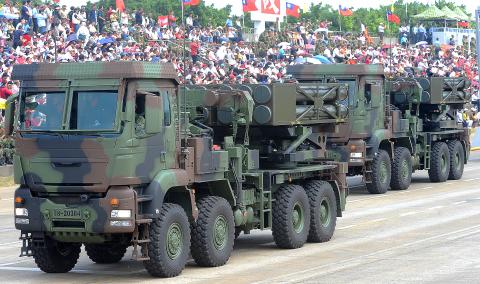Low spending on national defense as well as cuts in projected weapons acquisition, are signs that the armed forces are moving away from a combat-oriented to a relief-oriented military role and that detente in the Taiwan Strait is “unilateral,” critics of President Ma Ying-jeou’s (馬英九) administration have said.
During the presidential campaign in 2008, Ma vowed to bring spending on national defense to 3 percent of GDP, a pledge that he has not met in his four years in office. The proposed national defense budget for next year has been set at NT$314.15 billion (US$10.59 billion), lower than the NT$317.2 billion for this year.
China, meanwhile, has increased its military spending by double digits for most of the past decade, opposition lawmakers said, adding that this highlighted ignorance about the true nature of the Chinese threat on the part of the Ma administration.

Photo: Liu Hsin-de, Taipei Times
This year, China’s declared military budget will rise 11.2 percent to 670.27 billion yuan (US$106.41 billion), a figure that the Pentagon and military analysts argue does not reveal actual levels.
Beyond a failure to meet the target defense spending, appropriations for next year also indicate a shift away from combat readiness to operations other than war, predominantly relief operations, reflecting Ma’s 2009 announcement that natural catastrophes were now Taiwan’s “No. 1 enemy.”
The Chinese-language United Daily News reported on Sunday that initial plans by the army to procure 57 domestically produced Ray Ting-2000 (“Thunder 2000”) multiple rocket launchers for a total of NT$14.45 billion had been slashed by one-quarter in next year’s budget. According to the report, the Ministry of National Defense ordered in July last year that production be dropped to 43 launch vehicles, which are to be divided into three battalions. The budget for the acquisition has reportedly been cut to NT$13.22 billion.
Meanwhile, the ministry has set aside NT$860 million for eight new projects, of which more than half are to meet non-combat needs. Among the earmarked funds, NT$430 million has been set aside to purchase 73 excavators and loaders and NT$45 million to buy 128 rubber rafts.
The army said the purchases were to “strengthen disaster prevention and rescue capabilities and to expand the army’s capability to speedily repair roads and dredge waterways and reservoirs.”
Opposition lawmakers commenting on next year’s defense budget said appropriations failed to ensure the nation had the means to guarantee its defenses.
“The Ma administration has continually scaled back its military spending even though China’s threat to Taiwan has continued to rise over the past few years,” Democratic Progressive Party Legislator Hsiao Bi-khim (蕭美琴) was quoted as saying at the weekend.
Despite the relative calm in the Taiwan Strait since Ma’s election, Hsiao said the lack of reciprocity was impossible to ignore.
“The detente is just unilateral,” she said, pointing to the 1,600 ballistic and cruise missiles China has aimed at Taiwan — 200 more than last year, according to a report by the ministry on the People’s Liberation Army that was submitted to the legislature last week.
Additional reporting by AFP and Jake Chung

The brilliant blue waters, thick foliage and bucolic atmosphere on this seemingly idyllic archipelago deep in the Pacific Ocean belie the key role it now plays in a titanic geopolitical struggle. Palau is again on the front line as China, and the US and its allies prepare their forces in an intensifying contest for control over the Asia-Pacific region. The democratic nation of just 17,000 people hosts US-controlled airstrips and soon-to-be-completed radar installations that the US military describes as “critical” to monitoring vast swathes of water and airspace. It is also a key piece of the second island chain, a string of

A magnitude 5.9 earthquake that struck about 33km off the coast of Hualien City was the "main shock" in a series of quakes in the area, with aftershocks expected over the next three days, the Central Weather Administration (CWA) said yesterday. Prior to the magnitude 5.9 quake shaking most of Taiwan at 6:53pm yesterday, six other earthquakes stronger than a magnitude of 4, starting with a magnitude 5.5 quake at 6:09pm, occurred in the area. CWA Seismological Center Director Wu Chien-fu (吳健富) confirmed that the quakes were all part of the same series and that the magnitude 5.5 temblor was

The Central Weather Administration has issued a heat alert for southeastern Taiwan, warning of temperatures as high as 36°C today, while alerting some coastal areas of strong winds later in the day. Kaohsiung’s Neimen District (內門) and Pingtung County’s Neipu Township (內埔) are under an orange heat alert, which warns of temperatures as high as 36°C for three consecutive days, the CWA said, citing southwest winds. The heat would also extend to Tainan’s Nansi (楠西) and Yujing (玉井) districts, as well as Pingtung’s Gaoshu (高樹), Yanpu (鹽埔) and Majia (瑪家) townships, it said, forecasting highs of up to 36°C in those areas

IN FULL SWING: Recall drives against lawmakers in Hualien, Taoyuan and Hsinchu have reached the second-stage threshold, the campaigners said Campaigners in a recall petition against Chinese Nationalist Party (KMT) Legislator Yen Kuan-heng (顏寬恒) in Taichung yesterday said their signature target is within sight, and that they need a big push to collect about 500 more signatures from locals to reach the second-stage threshold. Recall campaigns against KMT lawmakers Johnny Chiang (江啟臣), Yang Chiung-ying (楊瓊瓔) and Lo Ting-wei (羅廷瑋) are also close to the 10 percent threshold, and campaigners are mounting a final push this week. They need about 800 signatures against Chiang and about 2,000 against Yang. Campaigners seeking to recall Lo said they had reached the threshold figure over the